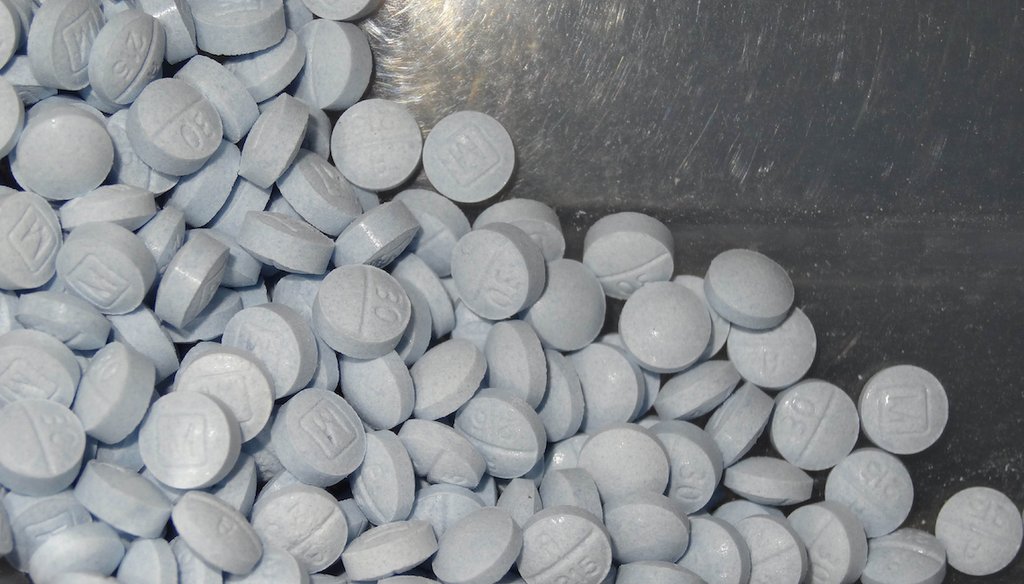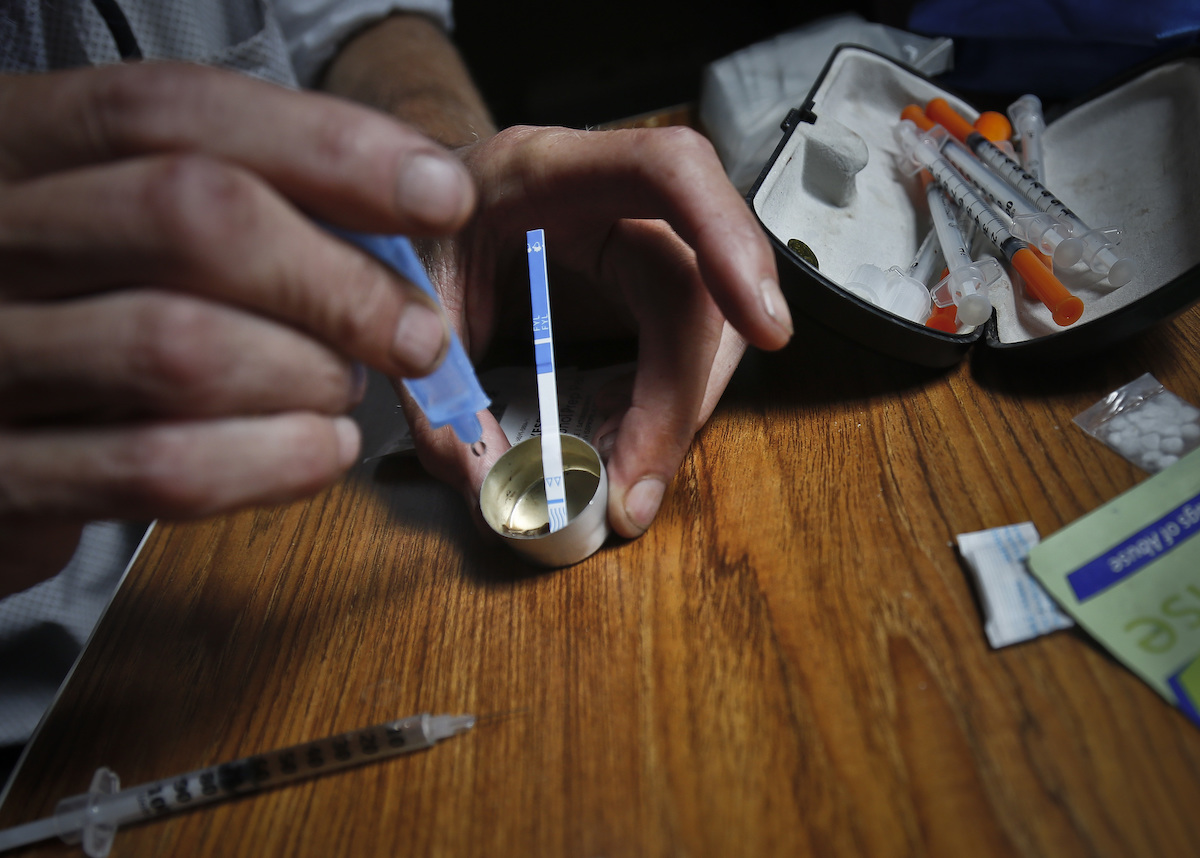Stand up for the facts!
Our only agenda is to publish the truth so you can be an informed participant in democracy.
We need your help.
I would like to contribute

This photo provided by the U.S. Attorney's Office for Utah and introduced as evidence in a 2019 trial shows fentanyl-laced fake oxycodone pills collected during an investigation. (AP)
If Your Time is short
-
Toxicology experts say it’s not possible to overdose from touching an item with fentanyl on it, or from breathing air in a room that has fentanyl.
-
Most fentanyl is smuggled in by U.S. citizens at official ports of entry, not by immigrants crossing the southern border illegally.
-
Fentanyl does not smell like popcorn when it burns. Fentanyl is odorless and tasteless, and only test strips can be used to determine whether a drug contains traces of fentanyl.
It’s a fact that more than 70,000 people nationwide died last year after overdosing on fentanyl, a powerful synthetic opioid.
The drug has drawn national attention because it’s so lethal, up to 100 times more potent than morphine. But the spotlight has also led to a lot of misinformation.
Politicians and pundits commonly misrepresent who brings fentanyl into the U.S. And stories of police officers and first responders becoming sick or overdosing by simply being around or touching fentanyl proliferate online — a phenomenon that toxicology experts say is not scientifically possible.
Setting the record straight on how people interact with fentanyl and how they can overdose is crucial, experts say, because every second matters when responding to someone with a medical emergency.
Here is the truth behind four common myths about fentanyl.
Sign up for PolitiFact texts
Myth: You can overdose by touching an item containing fentanyl.
This is False. It’s not possible to overdose from touching an item with fentanyl on it, according to medical experts. PolitiFact has previously fact-checked different versions of this claim, including that someone passed out from holding a dollar bill laced with fentanyl.
In 2017, the American College of Medical Toxicology and the American Academy of Clinical Toxicology released a joint statement saying "it is very unlikely" that skin exposure to fentanyl powder or tablets "would cause significant opioid toxicity."
Fentanyl isn’t absorbed well by the skin; for fentanyl to have a physical effect on the body, it must enter the bloodstream.
"It's really hard to get fentanyl into your body unless you directly snort it into your nose, directly drink it or inject it with a needle," said Robert Valuck, executive director of the Colorado Consortium for Prescription Drug Abuse Prevention at the University of Colorado.
When people overdose, their heart rate and breathing slows, and they fall unconscious.
If simply touching fentanyl could cause symptoms, drug users and health care workers "would be overdosing all the time given that they are constantly exposed," said Dr. Ryan Marino, a toxicologist and emergency room physician who studies addiction at Case Western Reserve University.
The symptoms people have reported when claiming they’ve touched fentanyl-laced items, such as dizziness, heart rate increases and passing out, aren’t consistent with a fentanyl overdose, Valuck said.
Dr. Andrew Stolbach, a toxicologist and emergency doctor at the Johns Hopkins Hospital, said first responders who believe these falsehoods might spend time putting on "unnecessary personal protective equipment" or be afraid to touch the person. So misunderstandings like this can be dangerous because "every second counts" when trying to help someone overdosing on fentanyl, he said.
"When you're rescuing somebody with an opioid overdose," Stolbach said, "the only one in danger is the person with an overdose."

A homeless person holds pieces of fentanyl Aug. 18, 2022, in Los Angeles. Use of the powerful synthetic opioid that is cheap to produce and is often sold as is or laced in other drugs, has exploded. (AP)
Myth: Breathing air in a room with fentanyl can make you sick.
Medical experts said this is false. That’s because fentanyl isn’t volatile, meaning it doesn’t easily become a vapor.
"It doesn't just go up into the air, into your nose where you inhale a lot of it and unintentionally get exposed or get sick," said Stolbach.
In contrast, being in a room with a substance such as ammonia can cause irritation to the skin or eyes because of its volatility, he explained.
Stolbach said "never yet, not once" has he seen a plausible case of somebody getting sick from unintentionally being exposed to fentanyl. "It just hasn't happened," he said.
People who come in contact with fentanyl and begin to feel sick could be experiencing a phenomenon known as "nocebo," Stolbach said. They may have heard that coming in contact with fentanyl will make them sick, so they may think they’re sick when they come into contact with the substance. They may start feeling lightheaded or anxious and attribute it to the fentanyl, rather than the anxiety of being around it.
"You don't have to worry about walking down the street and unintentionally getting sick from inhaling somebody else's fentanyl," Stolbach said.
Myth: Fentanyl deaths in the U.S. are increasing because immigrants are smuggling the drug through "open borders."
This is False.
The southern border is not wide open. Border protection funding and staffing have remained consistent between the administrations of former President Donald Trump and President Joe Biden, and border laws and policies continue to be enforced. Hundreds of miles of the U.S.-Mexico border has fencing to reduce illegal entries.
Also, most fentanyl is seized at official ports of entry and not between them, where most migrants try to cross the border, U.S. Customs and Border Protection data shows. And in 2022, 89% of convicted fentanyl drug traffickers were U.S. citizens.
"Drug traffickers deal with professionals, not amateurs, and they prefer U.S. citizens," Sanho Tree, director of the Drug Policy Project at the Institute for Policy Studies, a progressive Washington, D.C.-based think tank, told PolitiFact in 2022.
U.S. citizens and permanent residents are able to cross the southern border multiple times and know the territory better, Guadalupe Correa-Cabrera, an immigration expert at George Mason University told PolitiFact in August.

A person prepares heroin, placing a fentanyl test strip into the mixing container to check for contamination, Aug. 22, 2018, in New York. (AP)
Myth: Fentanyl smells like popcorn when it burns.
This is False. The Centers for Disease Control and Prevention reports that fentanyl is odorless and tasteless, and there is no visible way of knowing if or how much fentanyl a pill contains. However, low-cost test strips can determine whether a drug contains traces of fentanyl.
There is no evidence that burning or smoking fentanyl will produce a popcornlike scent, Dessa Bergen-Cico, public health professor and coordinator of Syracuse University’s addiction studies program, told PolitiFact.
Our Sources
PolitiFact, Fentanyl deaths are up, but GOP ads mislead by blaming ‘open borders,’ migrants crossing illegally, Oct. 28, 2022
PolitiFact, Are Biden’s border policies to blame for fentanyl deaths? Experts say no, Feb. 10, 2023
WFLA, VIDEO: Florida cop treated for overdose after possible fentanyl exposure, police say, Dec. 14, 2022
PolitiFact, It’s physically impossible to overdose from touching a dollar bill laced with fentanyl, July 29, 2022
PolitiFact, Vermont’s police chief said cops risk death from opioid exposure. He’s wrong., March 20, 2019
National Library of Medicine, Fentanyl panic goes viral: The spread of misinformation about overdose risk from casual contact with fentanyl in mainstream and social media, Sept. 16, 2020
Colorado University, Fentanyl and Counterfeit Prescription Drugs: Facts and Myths, Nov. 1, 2022
WISN, Two Milwaukee County deputies treated for fentanyl exposure, Aug. 28, 2023
Centers for Disease Control and Prevention, Ammonia, accessed Aug. 30, 2023
National Library of Medicine, The nocebo effect of drugs, April 2016
U.S. Customs and Border Protection, Nationwide Encounters, accessed Aug. 30, 2023
U.S. Customs and Border Protection, Drug Seizure Statistics FY2023, accessed Aug. 30, 2023
Cato Institute, U.S. Citizens Were 89% of Convicted Fentanyl Traffickers in 2022, Aug. 23, 2023
PolitiFact, To limit fentanyl supply, Tim Scott wants Title 42-like restrictions. Experts say they won’t help., Aug. 17, 2023
PolitiFact, Following your nose won’t find fentanyl, experts say, but using test strips will, April 28, 2023
Centers for Disease Control and Prevention, Fentanyl Facts, accessed Aug. 30, 2023
Centers for Disease Control and Prevention, Fentanyl Test Strips: A Harm Reduction Strategy, accessed Aug. 30, 2023
Phone interview, Andrew Stolbach, associate professor of emergency medicine at Johns Hopkins University, Aug. 29, 2023
Email exchange, Ryan Marino, associate professor at Case Western Reserve University School of Medicine, Aug. 29, 2023




































